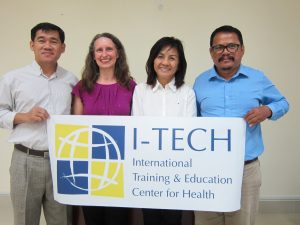In 2017, I-TECH began the DREAMS program in Khomas and Zambezi regions. The DREAMS program aims to reduce HIV infections among adolescent girls and young women (AGYW) through a core package of evidence-based interventions across health, education, and social sectors. At a safe space such as a school or community center, participants meet with a mentor who is trained to deliver a curriculum focused on the prevention of HIV and gender-based violence (GBV). Mentors help AGYW build strong social networks and empower them to make healthy and positive decisions. AGYW can also access on-site services like HIV testing, family planning, PrEP, counseling, and screening for GBV to protect against HIV infection. I-TECH has supported over 150 safe spaces since its launch and enrolled over 20,000 AGYW in the program.
I-TECH also supports programming for caregivers through the Families Matter! Program, which promotes healthy communication between parents and AGYW around HIV and GBV topics. I-TECH works closely with the Ministry of Education, Arts, and Culture; Ministry of Gender Equality and Child Welfare; Ministry of Health and Social Services; Centers for Disease Control and Prevention; and other implementing partners.
